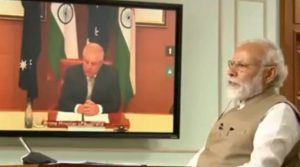Table of Contents
Daily Current Affairs for Government Exams:
Today Current Affairs: 5th June 2020 for UPSC IAS exams, State PSC exams, SSC CGL, State SSC, RRB, Railways, Banking Exam & IBPS, etc
Contents:
- India-Australia Virtual Summit :
- Virtual Global Vaccine Summit
- World Environment Day
- Periodic labor force survey
- `The Urban Learning Internship Program (TULIP)’.:
- Other important current affairs
1. India-Australia Virtual Summit :

First-ever India-Australia Virtual Summit was held between PM Modi and his Australian counterpart Scott Morrison.
- India and Australia have committed to elevating the bilateral Strategic Partnership concluded in 2009 to a Comprehensive Strategic Partnership (CSP).
- It is in line with India’s increasing engagement in the Indo-Pacific region through her Indo-Pacific vision.
- Both countries have committed to a new phase of the Australia – India Strategic Research Fund to promote innovative solutions for responding to and treating COVID-19.
- They agreed to broaden defense cooperation by enhancing the scope and complexity of their military exercises and engagement activities. They also agreed to boost cooperation in the maritime domain.
- It was the first time that PM Modi is holding a bilateral virtual summit with a foreign leader.
2.Virtual Global Vaccine Summit.:

Recently, the Prime Minister of India addressed the virtual Global Vaccine Summit.
- The Summit was hosted by the United Kingdom (UK).
- Almost 50 countries including the business leaders, UN agencies, civil society, government ministers, Heads of State, and country leaders participated in the Summit.
- The Summit was intended to urge nations around the world to pledge to fund vaccinations to protect the world from future outbreaks of infectious diseases.
- The Summit was aimed at raising USD 7.4 million to immunize further 300 million children in the world’s poorest countries by 2025.
India’s Contribution:
- India has pledged USD 15-million as India’s contribution to the Global Alliance for Vaccines and Immunizations (GAVI).
- GAVI is an international organization that brings together public and private sectors to create equal access to vaccines for children.
- India had also mentioned that it has shared its stocks of medicines with over 120 countries in the wake of the pandemic.
3.World Environment Day:

World Environment Day is observed on the 5th of June every year for encouraging worldwide awareness and action to protect our environment.
- The day has been celebrated since 1974 by engaging governments, businesses, celebrities, and citizens to focus their efforts on a pressing environmental issue.
- India will be focusing on the Nagar Van (Urban Forests) in addition to the official theme of the World Environment Day.
- Further, the Indian Navy has also marked the day through various initiatives that are intended to reduce its environmental footprint.
- The theme of World Environment Day 2020 is ‘Celebrating Biodiversity’—a concern that is both urgent and existential.
- Almost one million species are facing extinction worldwide and thus there has never been a more important time to focus on biodiversity.
- The day will be hosted in Colombia in partnership with Germany.
Initiatives by Indian Navy:
- Released ‘Indian Navy Environment Conservation Roadmap’ (INECR) which is a guiding document and key enabler for progressively achieving a green footprint.
- It has voluntarily implemented all six schedules of the International Convention for the Prevention of Pollution from Ships (MARPOL) regulations.
- It covers pollution of the marine environment by ships from operational or accidental causes.
- It lists various forms of marine pollution caused by oil, noxious liquid substances, harmful substances in packaged form, sewage and garbage from ships, etc.
- Currently, it has been focussing on the reduction of overall power consumption through a progressive induction of energy-efficient equipment.
4.Periodic labor force survey:

PLFS is India’s first computer-based survey which gives estimates of key employment and unemployment indicators like the labor force participation rate, worker population ratio, proportion unemployed, and unemployment rate in rural households annually and on a quarterly basis for the urban households.
- The PLFS also gives the distribution of educated and unemployed people, which in turn can be used as a basis for skilling of youth to make them more employable by industry.
- The survey was launched in 2017 and the first annual report was released (July 2017-June 2018), covering both rural and urban areas, in May 2019.
- Labour Force Participation Rate: It is the percentage of people in the labour force (those who are working or seeking or available for work) in the population.
- Worker Population Ratio is the percentage of employed people.
- The unemployment rate shows the percentage of people unemployed in the labour force.
- Unemployed: A person who is unable to get work for even an hour in the last seven days despite seeking employment is considered unemployed.
Key findings:
- India’s unemployment rate fell between July 2018 and June 2019 to 5.8% from 6.1% during the same period of 2017-18, even as the labor force participation rate rose to 37.5% from 36.9%.
- The worker population ratio also increased, to 35.3% as against 34.7% in 2017-18.
- Urban unemployment rate reduced to 7.7% in 2018-19 from 7.8% and in rural India to 5% from 5.3%.
- The female participation rate improved in both urban and rural India during the period under review, going up to 18.6% in 2018-19 from 17.5% the year before.
- To retain the falling trend in unemployment rate in 2019-20, which has witnessed a long nationwide lockdown between March and June to prevent the spread of Covid-19, resulting in job losses across sectors.
- According to monthly data from the Centre for Monitoring Indian Economy, the unemployment rate in India shot up significantly from 7.87% in June 2019 to 23.48% in May 2020.
5. `The Urban Learning Internship Program (TULIP)’.:

Union HRD Minister and Minister of Housing & Urban Affairs Shri Hardeep. S. Puri jointly launched `The Urban Learning Internship Program (TULIP)’.
- TULIP is a program for providing internship opportunities to fresh graduates in all Urban Local Bodies (ULBs) and Smart Cities across the country.
- Any graduate who has completed B. Tech, B. Arch, B. Plan, BSc, etc. can apply within 18 months from the date of its graduation.
- This will not only help the interns get hands-on experience in the vast activities of urban local bodies but will also help to create a resource upon which the industry can draw easily for hiring.
- TULIP has been conceived pursuant to the Budget 2020-21 announcement by the Finance Minister Smt. Nirmala Sitharaman under the theme ‘Aspirational India’.
- Technical support for the platform shall be anchored by AICTE and the programmatic non-technical support shall be anchored by Minister of Housing & Urban Affairs (MoHUA) over a period of 5 years.
- A Steering Committee under the Chairmanship of Secretary, MoHUA will review the progress of the program on a periodical basis.
Other important current affairs;
1. Gauhati High Court has directed Nagaland Assembly Speaker Sharingain Longkumer to conclude the disqualification proceedings against seven lawmakers of the Opposition Naga People’s Front (NPF) and pass appropriate orders within six weeks from June 2.
- On April 24, 2019, the NPF filed disqualification petitions against its seven suspended MLAs for “wilfully” defying its collective decision to support the Congress candidate in the 2019 Lok Sabha polls.
- NPF claimed the seven MLAs had willfully given up their party membership, thereby attracting provisions under the 10th Schedule (anti-defection law) of the Constitution.
- These MLAs, however, said as the NPF’s decision to support the Congress candidate was “against the principle of regionalism”, they said they had backed the other candidate. The NPF had not contested the polls.
3. Recently, the Ministry of Home Affairs (MHA) has announced to spend 10% funds of the Border Area Development Programme (BADP) only to improve the infrastructure along the China border.
- The Border Area Development Programme (BADP) has been allocated Rs. 784 crore for projects in areas of States/UTs inhabited along the Indo-China border i.e. Arunachal Pradesh, Himachal Pradesh, Ladakh, Sikkim, and Uttarakhand.
- The fund is distributed to the border States and Union Territories (UTs) depending on various criteria such as the length of the international border and population.
- Under this, the projects for developing strategically important villages and towns in border areas will be given priority.
- Construction of roads, bridges, primary schools, health infrastructure, playfields, irrigation works, etc. will be undertaken within 10 km of the border.
4. The International Day for the Fight against Illegal, Unreported, and Unregulated Fishing is being observed on 5 June 2020.
- On 5 December 2017, the United Nations General Assembly declared 5 June as the International Day for the Fight Against Illegal, Unreported and Unregulated (IUU) Fishing which was celebrated for the first time on 5 June 2018.
- The date was selected because 5 June is the date, in 2016 when the first international treaty designed to end illegal fishing the FAO Port State Measures Agreement entered into force.
- The UN Food and Agriculture Organization (FAO) is the lead agency for the new international day.
- This international day is an important opportunity to highlight efforts to combat illegal fishing.
5. The World Economic Forum (WEF) will adopt a new twin-summit format for its next annual Davos meeting in January 2021, by bringing together leaders from across the globe for in-person as well as virtual dialogues with a theme of ‘The Great Reset’.
- The gathering of the world’s rich and powerful, held every year in Davos, the Swiss ski resort town, will also open its doors virtually for everyone across the world online and through a network of more than 400 hubs globally.
- ‘The Great Reset’ will be the theme of this unique twin summit in January 2021. In the run-up to the main annual meeting, the WEF will also host a virtual series, The Great Reset Dialogues.
- The World Economic Forum (WEF), based in Cologny-Geneva, Switzerland, is an NGO, founded in 1971.
- The WEF hosts an annual meeting at the end of January in Davos, a mountain resort in Graubünden, in the eastern Alps region of Switzerland.
6. SpaceX’s Dragon spacecraft with two NASA astronauts successfully docked with the International Space Station (ISS) after a historic launch from the Kennedy Space Center in Florida, marking the dawn of a new age in commercial space travel.
- The SpaceX Crew Dragon spacecraft, carrying astronauts Behnken and Hurley, lifted off atop the company’s Falcon 9 rocket from Launch Complex 39A at NASA’s Kennedy Space Center.
- The crew will be welcomed aboard the ISS, where they will become members of the Expedition 63 crew, which includes NASA astronaut Chris Cassidy.
- The rocket, named Falcon 9, which carried the spaceship into the orbit, was built by SpaceX, a company founded by billionaire entrepreneur Elon Musk who also heads Tesla Motors which produces new-age automobiles.
- The mission was called Demo-2, in keeping with the fact that it was still only a ‘test flight’, which if successful, would lead to more missions in the coming months.
7.SWADES: Skill Mapping Exercise for Returning Citizens
- The initiative, undertaken as part of the Vande Bharat Mission, aims at empowering the returning citizens with relevant employment opportunities.
- It is a joint initiative of the Ministry of Skill Development & Entrepreneurship, the Ministry of Civil Aviation and the Ministry of External Affairs.
- The National Skill Development Corporation (NSDC)is supporting the implementation of the project.
- It aims to create a database of qualified citizens based on their skill sets and experience to tap into and fulfill the demand of Indian and foreign companies.
- The collected information will be shared with the companies for suitable placement opportunities in the country.
- The returning citizens are required to fill up an online SWADES Skills Card.
- The card will facilitate a strategic framework to provide the returning citizens with suitable employment opportunities through discussions with key stakeholders including state governments, industry associations, and employers.




